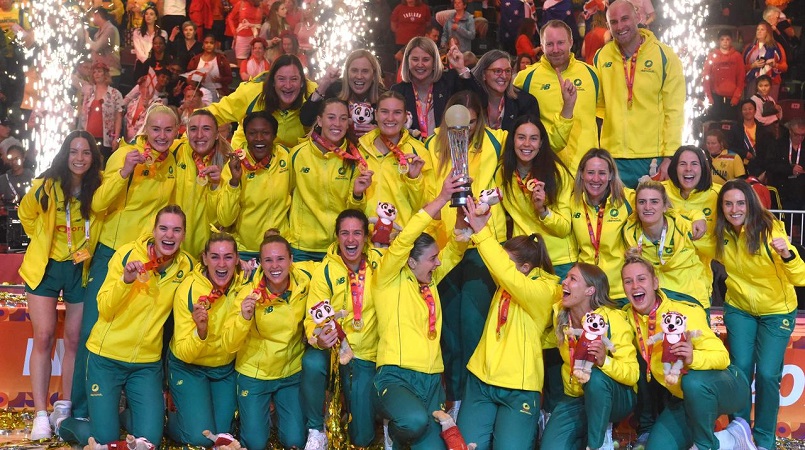
England’s dreams of taking home a first Netball World Cup title were crushed as Australia prevailed 61-45 to win in Cape Town.
Jess Thirlby’s side, hoping for a flourish to end their historic World Cup campaign, battled valiantly for the full 60 minutes but the world No 1 side were of a different class, turning the screw on England in the second half to storm to their 12th world title.
“It’s obviously going to bruise a little bit,” Thirlby said. “It’s just the margin; I don’t think it’s through a lack of effort or lack of belief. I think that’s the difference between a team being in 12 [finals] and us being in one. You’ve seen that we’re able to beat these teams but I think it’s maybe one game too far to be able to reproduce the form that it took to be able to get to the starting line of the World Cup final.”
Until now every World Cup final had been contested between New Zealand and Australia, the two dominant forces in world netball. But this Roses team, as they had done with their first major netball title win at the 2018 Commonwealth Games, used the guise of the underdog to slip their way into their first World Cup gold‑medal match.
The first warning sign that England might cause a stir came after they stunned Australia in the pool stages on Thursday to claim their first World Cup win against the Diamonds. Then when they dispatched the defending champions, New Zealand, in the semi‑finals, the first inklings of belief the Roses might do something unprecedented started to develop.
But Australia, intelligent students of the game, learned their lessons from that defeat by England and applied them dutifully. Thirlby conceded that proactive changes by the opposition, errors and limited turnover were all issues for her team.
“I just don’t think we very smart tonight,” the coach said. “I thought we fought and battled so hard in the first half. To go in only just four down [at half-time] I thought we had given ourselves a chance. We obviously tried to impact tactically. We made changes, which have worked well for us but it was a less stable ground for people to enter the game and I think that meant the demand on them to impact was high and a bit too much today.
“We absolutely knew that the demand on us was going to be that and then some in a final, just because of the conditions. And I think it has just eluded us to be able to produce that and more.” She concluded: “They were the better team in this final.”
England, at the blow of the first whistle, blinked first. Their opening centre pass went blasting over the sideline under the weight of defensive pressure and Australia capitalised. When it looked like the Diamonds might then make a run of it, Thirlby made her first change, throwing into the mix their perennial ball-winner Fran Williams, the mastermind behind England’s previous two wins. Her impact was instant, with the Roses able to catch up and level the score 13-13 at quarter-time.
The arm-wrestle for supremacy continued from the start of the second quarter. It was Australia, again, who wrested control first, through the defender Jo Weston. She continued to be a menace thereafter. Hanging on to the coattails of the star shooter, and most valued player of the tournament, Helen Housby, she stopped dead England’s attempts to claw the deficit back midway through the second frame.
Stacey Marinkovich’s decision to make wholesale changes to her shooting end paid dividends in the later stages of the 15 as Australia went on a four-goal uninterrupted run. At the break the Diamonds led 27-23.
In their previous World Cup encounter it was Thirlby who had outfoxed Marinkovich with her substitutions. This time it was the Diamonds coach who played all the right cards. After Ash Brazill had claimed a converted intercept early on to add to Australia’s lead, on came the defender Sarah Klau who produced another, putting England firmly in the back seat.
The defensive onslaught then continued, prompting questions around why Thirlby made her attacking change so late, with England losing possession twice through three-second calls. By the end of the third, the Roses were left with a nine‑goal lead to chase – an almost unassailable feat to overturn in a final.
Pride was on the line in the fourth quarter as England tried to reduce the deficit. But the clinical Diamonds were unrelenting in their pursuit of gold. The goal attack, and worthy player of the match, Kiera Austin (14 from 16), continued to pull the strings in the attacking end, servicing the miles done by the Australia defence until the final whistle.
Displays of ecstasy mixed with relief poured from the Diamonds as their achievement – of now holding all netball’s major titles – sunk in. England, meanwhile, were left to imagine what might have been.
